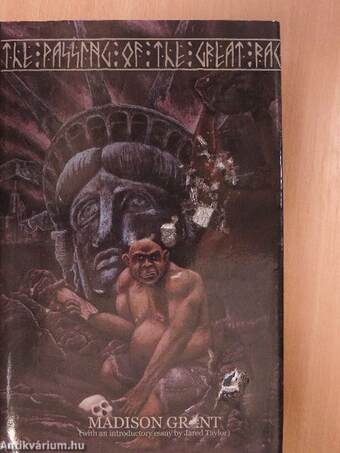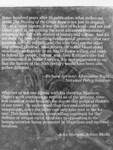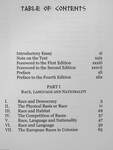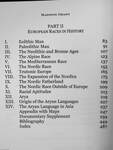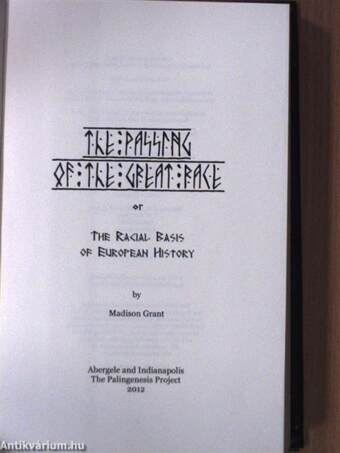1.104.896
kiadvánnyal nyújtjuk Magyarország legnagyobb antikvár könyv-kínálatát

VISSZA
A TETEJÉRE
JAVASLATOKÉszre-
vételek
The Passing of the Great Race
or The Racial Basis of European History
| Kiadó: | The Palingenesis Project |
|---|---|
| Kiadás helye: | Abergele |
| Kiadás éve: | |
| Kötés típusa: | Vászon |
| Oldalszám: | 507 oldal |
| Sorozatcím: | |
| Kötetszám: | |
| Nyelv: | Angol |
| Méret: | 22 cm x 14 cm |
| ISBN: | 978-0-9561835-5-2 |
naponta értesítjük a beérkező friss
kiadványokról
naponta értesítjük a beérkező friss
kiadványokról
Fülszöveg
Some hundred years after its publication, what strikes me
about The Passing of the Great Race is not just its original-
ity—as a racial history, it was the first of its kind—and not just
Grant's skill in integrating the most advanced evolutionary
science of his day with studies of history and culture. And it's
not even the book's startling fundamental premise—that race
grounds culture, religion, and the state (and not the other
way around.) Instead, what strikes me is that Grant stood
steadfastly and openly as an Anglo-Saxon willing and ready
to defend his people, culture, and class. If Grant's elite had
predominated in North America, it is no exaggeration to say
that the history of the 20th century would have been alto-
gether different.
—Richard Spencer, Alternative Right,
National Policy Institute
Whether or not one agrees with his theories, Madison
Grant's work continues to remind us of the genuine, time-
less issues at stake beneath the day-to-day political... Tovább
Fülszöveg
Some hundred years after its publication, what strikes me
about The Passing of the Great Race is not just its original-
ity—as a racial history, it was the first of its kind—and not just
Grant's skill in integrating the most advanced evolutionary
science of his day with studies of history and culture. And it's
not even the book's startling fundamental premise—that race
grounds culture, religion, and the state (and not the other
way around.) Instead, what strikes me is that Grant stood
steadfastly and openly as an Anglo-Saxon willing and ready
to defend his people, culture, and class. If Grant's elite had
predominated in North America, it is no exaggeration to say
that the history of the 20th century would have been alto-
gether different.
—Richard Spencer, Alternative Right,
National Policy Institute
Whether or not one agrees with his theories, Madison
Grant's work continues to remind us of the genuine, time-
less issues at stake beneath the day-to-day political rhetoric
of our times. He understood that race and culture are
inseparable, since the latter can only take root in the for-
mer. This book remains a compelling argument for the
defense of unique racial identities in opposition to the
homogenization being promoted by liberalism and multicul-
turalism.
—John Morgan, Arktos Media Vissza
Témakörök
- Történelem > Társadalomelmélet
- Filozófia > A szerző származása szerint > Amerikai
- Idegennyelv > Idegennyelvű könyvek > Angol > Természettudományok > Biológia
- Idegennyelv > Idegennyelvű könyvek > Angol > Filozófia > Nemzetisége szerint > Amerikai
- Idegennyelv > Idegennyelvű könyvek > Angol > Történelem > Európa története > Egyéb
- Természettudomány > Biológia > Fajfejlődés > Evolúció (származástan)
- Természettudomány > Biológia > Fajfejlődés > Darwin, darwinizmus
- Természettudomány > Biológia > Fajfejlődés > Idegennyelvű
- Filozófia > Témaköre szerint > Tanulmányok, esszék
- Idegennyelv > Idegennyelvű könyvek > Angol > Filozófia > Témaköre szerint > Tanulmányok, esszék
- Történelem > Idegennyelvű > Angol
- Történelem > Kontinensek szerint > Európa, európai országok története > Egyéb
- Filozófia > Témaköre szerint > Társadalomfilozófia > Egyéb
- Idegennyelv > Idegennyelvű könyvek > Angol > Filozófia > Témaköre szerint > Társadalomfilozófia > Egyéb
- Történelem > Politika > Ideológiák > Egyéb
Madison Grant
Madison Grant műveinek az Antikvarium.hu-n kapható vagy előjegyezhető listáját itt tekintheti meg: Madison Grant könyvek, művekMegvásárolható példányok
Nincs megvásárolható példány
A könyv összes megrendelhető példánya elfogyott. Ha kívánja, előjegyezheti a könyvet, és amint a könyv egy újabb példánya elérhető lesz, értesítjük.



